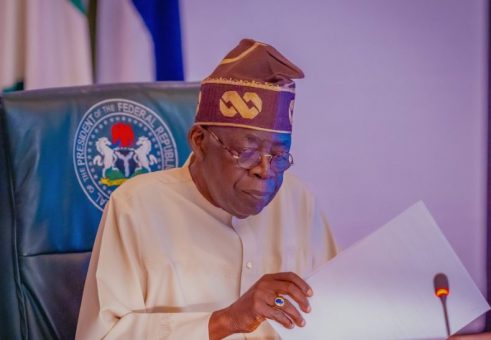It was meant to be a speech in response to the protest against the economic crisis as demanded by the organizers of the action. But, it was more than that. President Bola Ahmed Tinubu eloquently laid before Nigerians the scorecards of his administration across the critical sectors in the last 14 months in a logical sequence. Apart from demonstrating that his government has lived up to expectations in its fulfillment of the ‘Renewed Hope Agenda,’ the President also highlighted key policies and programs designed to bring succor and a new lease of life to Nigerians.
- How the economy fared in 14 months, by president
- ’Dashed hope being renewed’
- Revenue generation up to N9.1tr in six months
- Debt servicing funds cut from 97% to N68%
- Oil production raised to 1.61mbpd
- N570b cash released to 36 states
- Farming equipment coming from the U.S., Brazil, Belarus
The President said yesterday that he renewed the hopes of Nigerians that a future of plenty and abundance is on the horizon, encouraged by his administration’s significant strides in rebuilding the foundation of the nation’s economy since mounting the saddle 14 months ago.
The President, in a nationwide broadcast, in response to the ongoing protest against the economic crisis, said, for instance, that on the strength of his administration’s fiscal policies, aggregate government revenues have more than doubled, hitting over N9.1 trillion in the first half of this year.
Tinubu said the N9.1 trillion quantum leap in revenue generation in six months, compared to the first half of 2023, was a result of his administration’s efforts at blocking leakages, introducing automation, and mobilizing funding creatively without additional burden on the people.
He also said productivity is gradually increasing in the non-oil sector, reaching new levels and taking advantage of the opportunities in the current economic ambiance.
The President also informed Nigerians that from 97 per cent, his administration has cut Nigeria’s debt servicing to 68 per cent in the last 13 months.
“We have also cleared legitimate outstanding foreign exchange obligations of about $5billion without any adverse impact on our programmes,” he added.
This, Tinubu said: “has given us more financial freedom and the room to spend more money on you, our citizens, to fund essential social services like education and healthcare.
“It has also led to our state, and local governments receiving the highest allocations ever in our country’s history from the Federation Account.”
That’s not all. The President informed Nigerians that the nation’s once-declining oil and gas industry is experiencing resurgence, on the back of reforms announced by his administration in May to address the gaps in the Petroleum Industry Act.
He said, for instance, that last month, Nigeria’s oil production increased to 1.61million barrels per day, even as her gas assets are receiving the attention they deserve.
As sign of the resurgence, the President said investors are already staging a comeback. “We have already seen two Foreign Direct Investments (FDIs) signed of over half a billion dollars since then,” he said.
He also said the Federal Government has moved to address the nation’s sole dependence on oil-based petrol, neglecting its gas resources to power the economy, which it has also been using its hard-earned foreign exchange to pay for, and subsidise its use.
Accordingly, the President said government immediately launched the Compressed Natural Gas Initiative (CNG) to power the transportation economy and bring costs down.
He justified this move, saying, “This will save over N2 trillion a month, being used to import Petroleum Motor Spirit (PMS) and Automotive Gas Oil (AGO) and free up our resources for more investment in healthcare and education.”
Tinubu announced that to this end, government will be distributing a million CNG conversion kits of extremely low or no cost to commercial vehicles that transport people and goods and who currently consume 80 per cent of the imported PMS and AGO.
“We have started the distribution of conversion kits and setting up of conversion centres across the country in conjunction with the private sector,” he said, emphasizing, “We believe that this CNG initiative will reduce transportation costs by approximately 60 per cent and help to curb inflation.”
The President also said government has released over N570 billion to the 36 states to expand livelihood support to their citizens, while 600, 000 nano-businesses have benefitted from the administration’s nano-grants.
An additional 400,000 more nano-businesses are expected to benefit, even as he added that 75,000 beneficiaries have been processed to receive N1million Micro and Small Business single-digit interest loans, starting this month.
“We have also built 10 Micro, Small and Medium Enterprise (MSME) hubs within the past year, created 240,000 jobs through them and five more hubs are in progress which will be ready by October this year,” Tinubu said.
To galvanize the real sector, the President said payments of N1billion each are also being made to large manufacturers under his administration’s single-digit loans to boost manufacturing output and stimulate growth.
The President also said the agricultural sector has received priority attention in the past 14 months of his administration via the provision of incentives to farmers to increase food production at affordable prices.
“I have directed that tariffs and other import duties should be removed on rice, wheat, maize, sorghum, drugs, and other pharmaceutical and medical supplies for the next six months, in the first instance, to help drive down the prices,” Tinubu said.
He also stated that his administration has been meeting with governors and key ministers to accelerate food production. “We have distributed fertilisers. Our target is to cultivate more than 10 million hectares of land to grow what we eat,” he said.
According to him, the Federal Government will provide all necessary incentives for this initiative, whilst the states provide the land, which will put millions of people to work and increase food production.
Tinubu underscored his administration’s renewed focus on the agric sector, noting that in the past few months, “we have also ordered mechanized farming equipment such as tractors and planters, worth billions of Naira from the United States, Belarus, and Brazil. I can confirm to you that the equipment is on the way.”
Nigerian youths are also not left out in what promises to be the current administration’s renewed push to fashion out a new future for the economy and Nigerians generally.
He pointed out, for instance, that his administration has shown its commitment to the youth by setting up the student loan scheme, where, to date, N45.6 billion has already been processed for payment to students and their respective institutions.
The President, while encouraging more of vibrant youth population to take advantage of this opportunity, said this will consequently reduce corruption and eliminate cash and opaque transactions.
He said this week, he ordered the release of an additional N50 billion each for NELFUND – the student loan, and Credit Corporation from the proceeds of crime recovered by the Economic and Financial Crimes Commission (EFCC).
Additionally, government, he said, has secured $620 million under the Digital and Creative Enterprises (IDiCE) – a programme to empower young people, creating millions of Information Technology (IT) and technical jobs that will make them globally competitive.
“These programmes include the Three Million Technical Talents scheme,” Tinubu said, regretting, however, that “Unfortunately, one of the digital centres was vandalised during the protests in Kano. What a shame!”
He said in addition, the Federal Government has introduced the Skill-Up Artisans Programme (SUPA); the Nigerian Youth Academy (NIYA); and the National Youth Talent Export Programme (NATEP).
Tinubu also said apart from signing the National Minimum Wage into law last week, allowing the lowest-earning workers to now earn at least N70, 000 a month, his administration embarked on an ambitious housing programme.
He cited, for instance, the inauguration of the first phase of the administration’s ambitious housing initiative, the Renewed Hope City and Estate in Karsana, Abuja, six months ago.
“This project is the first of six we have planned across the nation’s geopolitical zones. Each of these cities will include a minimum of 1,000 housing units, with Karsana itself set to deliver 3,212 units,” he stated.
The President said in addition to these city projects, government is also launching the Renewed Hope Estates in every state, each comprising 500 housing units.
“Our goal is to complete 100,000 housing units over the next three years. This initiative is not only about providing homes but also about creating thousands of jobs across the nation as well as stimulating economic growth,” he emphasised.
Tinubu, while telling Nigerians, especially the youth, that “I have heard you loud and clear. I understand the pain and frustration that drive these protests,” assured them that government is committed to listening and addressing the concerns of citizens.
He, however, said: “We must not let violence and destruction tear our nation apart. We must work together to build a brighter future, where every Nigerian can live with dignity and prosperity.”
According to him, the task before us is a collective one, and I am leading the charge as your President. A lot of work has gone into stabilising our economy and I must stay focused on ensuring that the benefits reach every single Nigerian as promised.”

